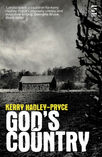Between States
- Kerry Hadley
- Nov 6, 2019
- 2 min read

Rob Francis regards the Black Country as a ‘liminal space. Not quite urban – not quite rural; it’s made up of a strange mix of green and grey spaces; much of its cultural identity is formed from its industrial heritage, but most of this is now obsolete, ruined, built over by retail sites and enterprise zones. All of these are typical of a post-industrial environment, examples can be seen in the suburbs of Gateshead and Glasgow. The Black Country has three further signs making it an exemplar of the post-industrial and the liminal: it’s not quite north and not quite south; it sits in the shadow of its bigger, wealthier, more successful brother, Birmingham; and, most importantly, it is defined by its own name, flag, set of dialects and heritage, but it has no fixed boundary.’ (Francis 2019: 13-4) His theory links the Black Country to Queer Theory, and both to ‘liminality’. He regards both as being ‘borderless’ or having ‘borderlessness’ (p 3), and considers liminality to be ‘being between states.’ (p 16) His analysis of the region’s literature looks at the portrayal of the Black Country and its characters as being in positions of flux, contradiction and transition.’ (p 16).
I’ve also been re-reading Joel Lane’s From Blue to Black. In it, ‘Stourbridge was cut in pieces by expressways that ran a different kind of time.’ (p 49) One of the characters, Karl, says: ‘“The Black Country’s full of Irish families. I think they found the isolation, the strangeness, a sort of comfort.”’ (p 49) and ‘“I was born in Stourbridge,” Karl said. “My childhood was really peaceful. It seemed such an innocent place, the mix of forest and factories.”’ (p 51).
Rob Francis argues that ‘the Black Country, as depicted in the region’s literature, becomes this state of rebellion – a deliberate facing of the abject or uncanny.’ (Francis, 2019: 8)
I like all this as really good examples of what makes the Black Country and it’s writing so worthy of research.
This ‘liminality’, ‘strangeness’ and ‘different kind of time’ has made me think about my process of writing God’s Country, and, although I don’t want to venture into Francis’ academic territory, I am aware that perhaps the creative writing style I use does have what I have already referred to here as a ‘liminality of sentence construction’ – phrases on the threshold of meaning, or non-meaning, more than just ‘unreliability’ – and as a result, I’ve spent this week changing things, altering, very slightly that sense of characters and of place being on the edge in this novel. What was also interesting was that writing this in conjunction with re-reading Lane has resulted in a kind of palimpsest, which I like.
Tomorrow, I’m off to Sibiu in Romania to the Being Human Festival for a few days with the University of Wolverhampton, to continue research into smells & memory, to tell them about my research, and to read some of my Black Country writing to them. I’ll be interested in their reactions.
Francis, R. 'Queering the Black Country: A Critical and Creative Response.' PhD thesis 2018 https://wlv.openrepository.com/handle/2436/622334 [ACCESSED 15th September, 2019)
Lane, J. (2000) From Blue to Black. London: Serpent’s Tale









Comments